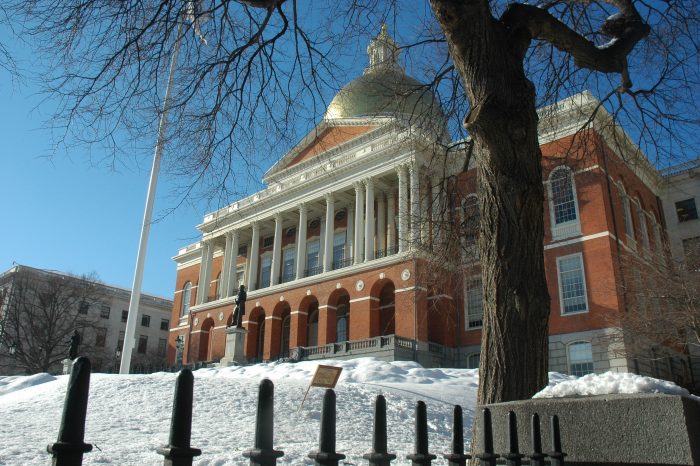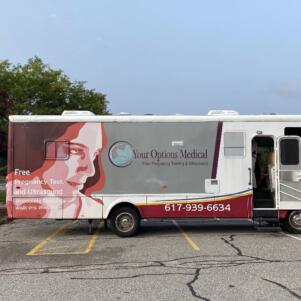Several Hundred Pro-Family Massachusetts Residents Turn Out To Lobby Legislators on Beacon Hill
By Matt McDonald | March 20, 2019, 14:07 EDT

Several hundred people showed up on Beacon Hill on Wednesday to lobby Massachusetts state legislators to vote against a conversion therapy ban, a bill that would remove remaining restrictions on abortion, and a bill that would require all public school districts to teach so-called “comprehensive” sex education if they teach sex education at all.
Organizers from the Massachusetts Family Institute estimated the crowd at 500. They posted video of several pre-lobbying presentations from a gathering at Park Street Congregational Church at the foot of Beacon Hill on the Massachusetts Family Institute’s Facebook page.
Andrew Beckwith, president of the Massachusetts Family Institute, spoke about the Massachusetts Senate version of the proposed conversion therapy ban, which would not only outlaw techniques designed to change the sexual orientation or gender identity of a child 17 or younger but would also define them as child abuse.
“This is a law that gives the state the power to take away your daughter and make her someone else’s son,” Beckwith said. “It’s terrifying, terrifying stuff.”
Homegrown lobbyists, many of them wearing red Massachusetts Family Institute T-shirts, were planning to visit the offices of individual legislators and of Governor Charlie Baker at the State House on Wednesday afternoon.
The Massachusetts House has already passed a version of the conversion therapy ban that doesn’t include the child-abuse provision. The Senate bill includes the child-abuse provision, but the lead sponsor of the bill said recently he might be amenable to taking it out in the interests of getting a finished bill quickly to Baker, who has said he’s inclined to sign it.
Opponents are hoping to change the governor’s mind, but they have a Plan B if he doesn’t.
“If he doesn’t veto it, we’re going to sue. We have a good precedent from last year. We think we’ve got a pretty good shot,” Beckwith said.
The abortion bill, known as the ROE Act, would remove remaining restrictions on abortion after 24 weeks and by minors, and would also remove a provision in state law that currently requires doctors to try to save the life of a baby who is born alive after an attempted abortion.
A companion bill would require that all health insurance plans in Massachusetts pay for abortions. The state already pays for abortions for poor women who qualify for MassHealth, the state’s Medicaid program, following a 1981 decision by the Massachusetts Supreme Judicial Court.
“This is some of the most extreme pro-abortion legislation in the world,” said Christopher Jay, policy analyst for the Massachusetts Family Institute.
As for the sex education bill, Beckwith said that so-called “comprehensive” sex education curriculums approved by the state’s education department encourage techniques to perform oral and anal sex while avoiding disease to students as young as 12. School districts can use such curriculums now if they wish, but the bill before the state Legislature would require all districts to use them if they teach sex education. Supporters describe the Planned Parenthood-approved sex-education curriculums as “medically accurate and age appropriate.”
While conservatives are usually on the defensive in Massachusetts, two speakers talked about opportunities to advance their cause.
Michael King, director of community alliances for the Massachusetts Family Institute, spoke about the organization’s seemingly unlikely inroads in Lawrence.
Lawrence, the poorest city in Massachusetts, is heavily immigrant and heavily Democratic. But it was also the first municipality in Massachusetts to ban recreational marijuana shops and the only sizable community in the state in November 2018 that voted No on Question 3, which sought to repeal a law prohibiting discrimination on the basis of gender identity in public accommodations including bathrooms and locker rooms.
“If every city and town in Massachusetts could be Lawrence, we would be able to turn the state,” King said.
Chanel Prunier, executive director of the Renew Massachusetts Coalition, asked listeners to spend time in grassroots campaigning for conservatives.
“The left wins elections by going door to door,” Prunier said, citing the 2018 election defeat of Jim Lyons, a conservative who is a former Republican state representative from Andover and currently chairman of the Massachusetts Republican Party.
Prunier said that many of the state legislators currently on Beacon Hill are further left than most voters in the state, and that they’ve succeeded in getting elected because of a concerted effort by the left to recruit candidates and work on their behalf.
“What we need to really turn Massachusetts around is to activate all of you in the election process,” Prunier said. “… We need more allies on Beacon Hill, or we are going to keep getting the same bad public policy.”
Lobbying isn’t just about informing, she said, contrary to what many people think.
“And unfortunately there is sometimes this mentality that, you know, ‘Oh, we just tell the state representatives what’s in this legislation, and they’ll say, ‘O my gosh,’ and they’ll exert some common sense,” she said, to laughter, “and they will vote against this.’ And unfortunately, we’ve done this for a while, and the scary fact emerges that a lot of them not only know what’s in the legislation, they really are advocates for some of this crazy stuff. And they have been elected by people who are like you in many respects, but who are activists for the other side – who are activists for Planned Parenthood, who are activists for the transgender lobby.”
She noted that many state representatives run for office out of their own financial interest, and fear the Speaker of the House and the governor more than they fear their constituents. Others “genuinely believe in very far left ideology,” she said.
“It’s not easy to lobby these folks. It’s not easy to change their mind. At the end of the day, what we probably need to focus on is replacing them,” Prunier said.
Many people in Massachusetts assume the state is so liberal that conservatives have no hope of making a dent in it, but Prunier said there are conservative and Republican-leaning areas of the state where voters might be willing to support a conservative candidate, but volunteers are hard to find and no candidate emerges.
“If every one of you in this room helped us knock on doors for even just a weekend, we would elect far more people and be far better represented at the State House,” Prunier said.











